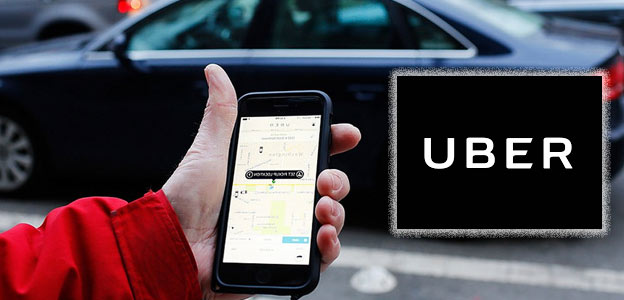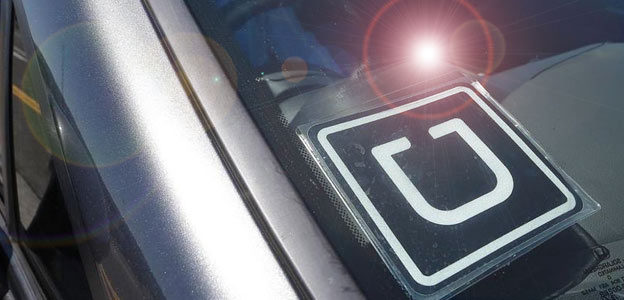Uber / Ride Share Tax Tips: Are you a rideshare or delivery driver working with Uber, Lyft or Amazon? As an independent contractor, you’re responsible for your own taxes (which is no fun) but the silver lining is there are a lot of potential deductions out there to help you wrestle your money back from Uncle Sam.
In fact, many drivers miss out on some important tax deductions because they don’t even know they qualify for them.
Read on to find out the 9 essential tax tips for ride-share drivers, and make sure you’re not paying more than you should!
TurboTax + Uber Tax Tips:
1) Know Your Tax Deductions
Many drivers just don’t know their rights, and worker benefits are still in their infancy when it comes to Uber and Lyft drivers.
The truth is there are TONS of readily available tax deductions, and pursuing them is one of the most valuable tax tips in this list.

Driver tax deductions include:
- actual expenses
- standard mileage
- depreciation (owned)
- gas & tolls
- auto loan interest (owned)
- insurance
- car washes
- parking fees
- Mobile phone, chargers, etc
- AAA membership
- Some auto parts
Idea: Do you provide drinks to your passengers? If so, that’s a deduction. There are many other possible write-offs, so do your research and claim all possible deductions!
2) Learn How to File Taxes With a 1099
As an independent on-demand driver, you are basically a freelance contractor.
Even if you trust your tax professional with all your tax filings, you should at least know how to file taxes with a 1099. This will give you an insight into how the industry works and what the federal and state governments expect from you. It will also allow you to see your deductions more clearly and adjust your work accordingly.
*Related: Tax software designed for Uber and Lyft drivers:
3) Know the Difference Between Revenue and Income
Uber’s 1099 requires you to report both your total trip revenue and the net income you received from Uber, which means you need to know the difference between revenue and income.
Simply put, income equals the total ride revenue minus all expenses and fees. This is complicated to track all by yourself, though Uber’s dashboard gives you some help. Lyft’s 1099 shows your net income, so you can file your taxes more easily with their form.
4) Save For Your Taxes
You know that death and taxes are certain, and as an independent contractor, your taxes are not withheld. This means that you will be required to pay them in full at the end of the year.
If you’ve spent all your money by then, you won’t be able to pay your taxes, and this can lead to fines and disruptions. To avoid that, make sure you set aside a portion of your income each month. At least manage your budget to make sure you have enough to fulfill your tax obligations when they are due.
Saving for the end of the year is one of the most essential tax tips (rideshareroadmap.com) for your ongoing business!

5) Uber, Lyft, Amazon Drivers: You Will Need to Pay Estimated Taxes
As an Uber driver, you are required to prepay your taxes through estimated tax payments to the IRS four times per year.
Most drivers are used to W2 withholding as full-time employees. However, Uber, Lyft, and Amazon delivery drivers are independent contractors and therefore not subject to withholding.
Instead, drivers get a 1099 form and are responsible for paying taxes depending on when you started driving and how much money you make. If you are not hitting the minimum $400 per year, you might not even have to pay federal taxes for your driving! (Note that you still have to fill out a tax return to report your earnings to the IRS.)
For example, Lyft sends out a 1099-K if you have at least $20k in ride revenue and 200 trips, and a 1099-MISC if you have $600+ from non-driving activities. Obviously, these rules are only applicable in the US, and you still have to report everything, even if you don’t have to pay any taxes.
*Related: TurboTax: Free State efile?
6) Pay Your Taxes (and Do It On Time!)
This is the most blindingly obvious of our tax tips, but many drivers just get it wrong. Especially if you’re filing your taxes by yourself, you might miss paying something you owe.
For example, in many cities, freelance drivers are required to register as a business and pay corresponding business taxes. Not doing so is illegal and will get you into big trouble! The business tax for Uber drivers is small, but the fines are hefty, so always make sure you know what you owe and to whom.
7) Modernize Your Operations
As an Uber, Lyft, or Amazon delivery driver, you should get a small business version of advanced tax software like TurboTax Self-Employed that makes reporting easy for self-employment income.
Additionally, you will need to use Uber, Lyft or Amazon’s dashboard to track all sorts of metrics anyway, so you should keep all your taxes digital. Especially for Uber and Lyft, you also need some external software to track write-off mileage.
You need to keep detailed records to justify your tax-deductible business expenses, and tracking all these is virtually impossible without the right software.
8) Write Off Mileage
You must choose between “Standard Mileage“ deduction method, OR, the “Actual Expense“ method; not both!
Note that you can write off mileage as part of your taxes. Uber dashboard gives you a comprehensive breakdown of the total miles you drove while driving passengers.
In addition to mileage while driving passengers, you can also write off mileage from driving around and waiting for ride requests and driving to pick up a passenger after receiving a ride request. Uber does not track deductible mileage for these extra commutes.
You are responsible for keeping records on these extra miles and submitting it with your 1099. Otherwise, you’re paying more than you should!
9) Enlist Professional Help
Taxes are extremely complicated. Sometimes it’s preferable to invest some money and have reliable tax professionals handle all your taxes. An accountant with experience in Uber, Lyft, and Amazon delivery taxation can give you expert tips and save you a lot of time and effort.
A tax professional might also identify more deductions and prevent costly mistakes by accurately estimating your taxes and sending you timely payment reminders.
Additionally, all reputable tax professionals guarantee your tax returns and are legally bound to defend you in case of an audit.
MightyTaxes is a reputable site that provides FREE tax tips and expert commentary on tax-related news stories. There, you can keep up with all the latest news and get an unbiased view on what’s going on with taxes. Are you a member of banks like Fidelity or Bank of America? There are special discounts for software like TurboTax available during tax season.
If you are an Uber, Lyft, or Amazon driver, please share any comments or tips that you have below! – Missy

